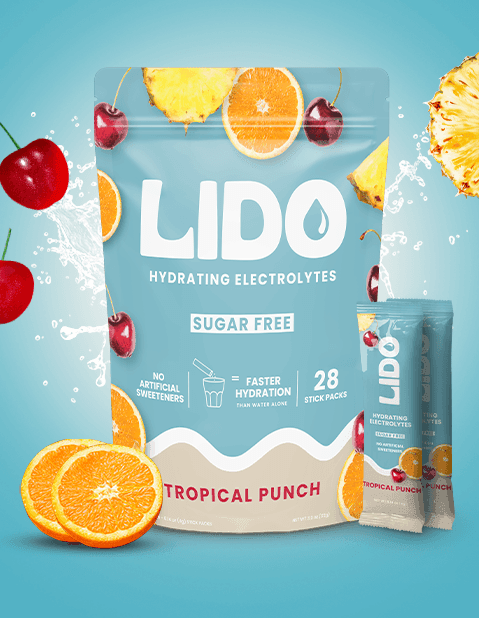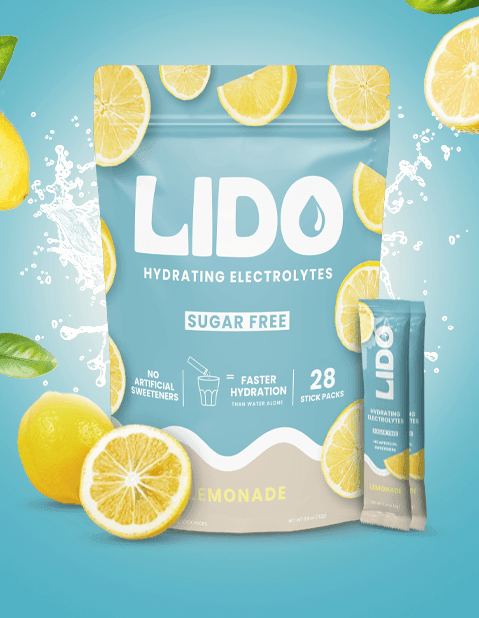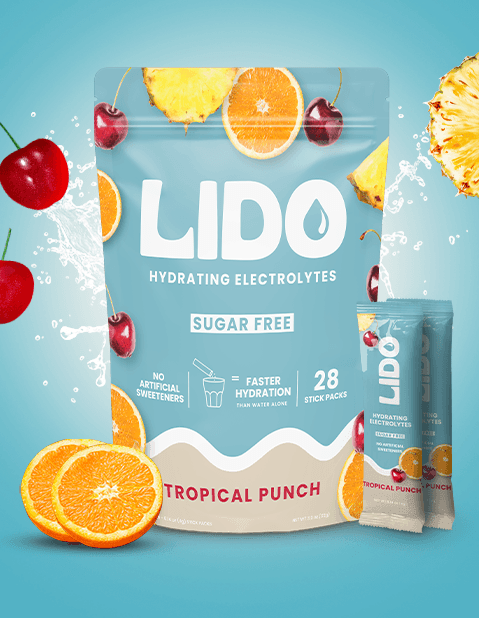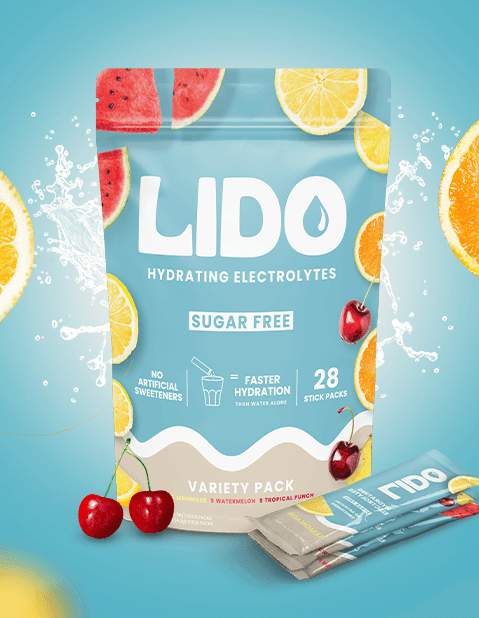How Electrolytes Can Help You Sleep — and Ways to Up Your Intake
Jennifer DouglasShare

Nothing beats a good night’s sleep. But if you’re like the 50 to 70 million Americans with chronic or ongoing insomnia, catching more quality Z’s can seem like a pipe dream.
Scroll TikTok, however, and you might see videos of influencers touting the “sleepy girl mocktail” as an antidote to poor sleep. While there’s no shortage of sketchy health advice on social media, there might be some science behind that claim; specifically, this viral pre-bedtime drink contains various ingredients that support quality sleep. For instance, magnesium, one of the body’s electrolytes, “can help you sleep longer, get better quality sleep, and feel less tired,” SleepFoundation.org reports.
The findings aren’t talked about enough, so unless you’re really into electrolytes like we are, you might discover something new today. Ahead, we discuss how magnesium and a few other electrolytes can improve sleep and the best electrolyte supplements to help you doze off faster and achieve more of that sweet, restful slumber.
Why We Need Sleep
Many of us view sleep as a period of downtime when our tired bodies and brains can finally get a break. While that’s a huge benefit, the perks of sleep are far more profound. Dr. Matthew Walker, a neuroscientist and sleep expert at the University of California, Berkeley, pretty much sums up our need for sleep in his book Why We Sleep: “The shorter your sleep, the shorter your life.”
That said, here are a few of the many health benefits of sleep:
Sleep enhances brain function and health.
If you’ve ever felt sharper and more aware during the day after a good night’s rest, you’ve experienced first-hand the brain-boosting power of sleep. Sleep allows the brain to rest and rejuvenate itself by clearing out toxins and waste products built up during the day, the University of Utah Health explains. Based on scientific research, well-rested people tend to think more clearly, focus better, have quicker reflexes, and make decisions more quickly.
Beyond that, one study finds that during sleep, our brains process and sort through information, aiding problem-solving, learning new skills, and forming memories. Research also suggests that the detoxification process that occurs within the brain during sleep reduces the risk of various neurological diseases and disorders like Alzheimer’s.
Sleep can boost your mood.
Think about how you feel after one or more sleepless nights. You’re likely more sluggish, lethargic, and vulnerable to stress. Then, almost magically, one or more restful nights lift your mood. WebMD shares a possible reason for this: “[that] refreshing slumber helps you hit the reset button on a bad day, improve your outlook on life, and be better prepared to meet challenges.”
In one study, researchers found that participants who had only 4.5 hours of sleep a night for one week reported feeling more stressed, angry, sad, and mentally exhausted. When they resumed normal sleep, they reported a dramatic improvement in mood. It makes sense, given that “…sleep is important to several brain and body functions engaged in processing daily events and regulating emotions and behaviors,” the Columbia University Department of Psychiatry explains.
Sleep can improve whole-body health.
Sleep is one of the pillars of health. It impacts virtually every system and organ in our bodies, so not getting enough of it could seriously degrade our health. According to the Journal of Clinical Sleep Medicine (JCSM), the body performs essential restorative processes during sleep, including repairing tissues and regulating hormones. In addition, sleep fine-tunes our metabolism, recalibrates our emotions, strengthens our immune system, and regulates our appetite.
Research also shows that consistently getting 7-9 hours of uninterrupted sleep can lower the risk of chronic conditions such as diabetes, heart disease, and obesity and improve overall cognitive function, mood, and physical resilience.
Sleep may boost athletic performance and recovery.
When brainstorming ways to supercharge your athletic performance and recovery, sleep likely doesn’t cross your mind. However, it’s more important than you might think. How much so, you ask? Well, Sleep Foundation reports remarkable performance improvements in well-rested athletes:
- Basketball players who slept up to 10 hours saw a 9% improvement in free-throw and three-point shot accuracy and faster sprint times.
- Swimmers experienced faster reaction times, improved turn times, and increased kick strokes.
- Tennis players increased serving accuracy from 36% to 42%.
According to Mayo Clinic, sleep is also a recipe for recovery: “As you push your body to be stronger, go faster, and be more agile, your tissues undergo continual wear and tear. Sleep provides your body time and energy to repair the wear and tear. You’re less likely to be injured because your body has undergone these repair sessions. You’re also less likely to become ill because sleep strengthens your immune system.”
What Happens When You Don’t Get Enough Sleep?
Given how closely sleep is tied to health, you can almost predict the consequences of deprivation. As Kelly Murray, a certified pediatric and adult sleep consultant, says in a PopSugar article, “Not getting enough sleep impacts every facet of someone’s life, from lowered immunity, disrupted digestion, and increased feelings of depression and anxiety to more long-term consequences such as increased risk of developing metabolic and heart disease.”
On top of that, your ability to think, make decisions, and solve problems all take a hit when you’re sleep-deprived, Case Western Reserve University points out. On a larger scale, this can lead to adverse outcomes like drowsy driving, which causes an estimated 6,400 fatal crashes each year in the U.S. It may also affect our performance on the job, collectively costing up to $411 billion annually in lost labor productivity, according to the study Why sleep matters – the economic costs of insufficient sleep.
Despite knowing how important sleep is, many struggle to get enough of it. It’s not always as easy as closing our eyes and drifting into dreamland. Various factors can influence our sleep patterns and quality, but one of the most overlooked ones is electrolyte balance.
Let’s explore electrolytes and how they can help unlock more restful nights and energized days.
How Electrolytes Can Help Optimize Your Sleep
Electrolytes aren’t only meant for athletes and others seeking a hydration boost; these electrically charged minerals (like sodium, magnesium, and potassium) are also essential for those searching for sound sleep. As Healthline explains, electrolytes help regulate nerve signals, muscle contractions, hydration levels, and other functions that could set you up for better rest. When they’re out of balance? Your sleep might suffer.
Let’s look at the primary sleep-enhancing electrolytes and dive into the science behind them.
Magnesium and Sleep
Beyond helping you poop, regulating blood sugar levels, and reducing bad cholesterol, magnesium supposedly has another unique superpower: optimizing sleep. Actually, it’s the most researched and published electrolyte for sleep, which explains why you might see countless ads hailing magnesium as the ultimate sleep aid.
This isn’t surprising considering that people with insomnia are often deficient in magnesium, says Michael J. Breus, Ph.D., Clinical Psychologist and Sleep Specialist. “People with low magnesium often experience restless sleep, waking frequently during the night. Maintaining healthy magnesium levels often leads to deeper, more sound sleep,” he explains.
With that said, let’s look at the various ways magnesium might impact your sleep:
- It promotes relaxation.
Magnesium is so soothing for the brain that it’s nicknamed “the original chill pill” and “nature’s valium.” Research suggests this relaxative effect might translate into quicker drowsing offs and better sleep. Essentially, magnesium blocks the transmission of glutamate, a neurotransmitter that increases excitatory activity in the brain, while increasing gamma-aminobutyric acid (GABA), a calming neurotransmitter. This helps “quiet” the brain, resulting in a more peaceful, restful state and making it easier for you to relax and fall asleep.
- It balances your hormones.
Besides lulling you to sleep, magnesium balances various hormones influencing sleep patterns. A 2012 study found that older adults who took 500 mg of magnesium daily for eight weeks experienced longer and more efficient sleep. By upping their magnesium intake, the participants experienced the following benefits:
- lower cortisol, a stress hormone (usually, less stress equals better sleep)
- increased renin, a hormone linked to deeper sleep
- higher melatonin, a hormone that improves sleep-wake cycles
So, if you’re waking up frequently or struggling to doze off when your head hits the pillow, magnesium might be your new best friend.
- It helps regulate the body’s circadian rhythm.
Your body runs on a 24-hour schedule called the circadian rhythm. Medical News Today explains that it essentially acts like an internal clock that tells you when to wake up, eat, and wind down for the night. This rhythm is controlled by a “master clock” in your brain that takes cues from external signals.
For instance, morning sunlight tells your brain to stop producing melatonin (the hormone that makes you sleepy) and start waking up. As night falls, melatonin production ramps up to help you drift off. However, light isn’t the only thing keeping this clock ticking. Research shows that magnesium levels in cells fluctuate in sync with this rhythm, helping your body stay on schedule. When everything is aligned, you sleep better. When it’s not, you’re staring at the ceiling at 2 a.m., wondering why.
- It helps reduce nighttime leg cramps.
Here’s something else that can ruin a good night’s sleep: being jolted awake by a Charley horse—the common name for a muscle cramp or spasm. Anyone can experience nighttime leg cramps, but some individuals are at greater risk, like those deficient in magnesium. A 2021 study found that supplementing with 226 mg of magnesium oxide daily significantly reduced nocturnal leg cramps in people prone to them. By relaxing the muscles and preventing those sudden, sharp spasms, magnesium can make those middle-of-the-night episodes far less likely, thus improving sleep time.
Sodium Deficiency and Sleep
Sodium often gets a bad rap for its link to various health issues, but banishing it from your diet can seriously backfire, especially when it comes to sleep. In a scientific review of 185 studies, researchers found that reducing sodium intake from 201 mmol/day (considered the high usual level) to 66 mmol/day (corresponding to the recommended level) showed a significant increase in the stress hormones adrenalin and noradrenalin. These hormones are crucial if you’re trying to escape danger—not so much when trying to fall asleep.
Another study found that restricting sodium intake to less than 500 mg daily disrupted Rapid Eye Movement (REM) and deep sleep in young men while increasing stress hormone levels.
Potassium and Sleep
Although potassium isn’t discussed as much as, say, magnesium when it comes to sleep, it should probably be. After all, potassium helps regulate nerve signals and muscle contractions and promotes relaxation, vital for sleep. A small 1991 study found that potassium supplementation improved sleep efficiency (the percentage of time spent sleeping versus tossing and turning) from 89% to 94% in men on low-potassium diets. While more research is needed, optimizing potassium intake could be an easy way to support quality sleep, especially since potassium has other benefits, like helping to reduce stress and anxiety, regulating levels of melatonin and cortisol (alongside magnesium), and minimizing wake-after-sleep onset (WASO).
Calcium and Sleep
Calcium isn’t just good for building and maintaining strong teeth and bones; it also promotes deep, restorative sleep by controlling slow-wave brain activity. Conversely, low calcium levels have been linked to longer times needed to fall asleep and less efficient rest overall. Research shows that calcium helps the brain use the amino acid tryptophan to manufacture the sleep-inducing substance melatonin, which is essential for initiating and maintaining sleep. This explains why dairy products, high in tryptophan and calcium, rank among the top sleep-inducing foods. So, if you’re not getting enough calcium through diet or supplements, this conversion process might be disrupted, resulting in lower-quality sleep.
How to Incorporate Electrolytes into Your Diet for Better Sleep
Our bodies lose electrolytes through everyday activities like breathing, urinating, and sweating. They’re also depleted from vomiting or diarrhea. When trying to replenish this loss, your daily diet should be your first focus. Eating whole foods that are naturally rich in electrolytes is the way to go, as they are easily digested, often have a pleasant taste, and provide a range of compounds that can support your health and well-being.
With that in mind, here are several healthy foods you can add to your diet to help optimize your sleep:
- For magnesium, dark leafy greens are a great option. Spinach, kale, and Swiss chard are also excellent sources, providing up to 157 mg per cup. Other magnesium-rich options include avocados, nuts, seeds, and whole grains.
- Potassium can be found abundantly in fruits and vegetables. Bananas are a well-known source, but don’t overlook other options like sweet potatoes, avocados, and leafy greens. Dairy products, legumes, and some fish are also good sources of potassium.
- Calcium is mainly associated with dairy products, but worry not if you’re lactose intolerant or vegan. Leafy greens, particularly collard greens and kale, are rich in calcium. Tofu made with calcium sulfate and fortified plant-based milks are also excellent alternatives.
- If you need to increase your sodium intake, consider adding a pinch of salt to your meals or water or consuming foods like olives and pickles, cured meats and cheeses, shellfish like oysters and mussels, salmon, and whole milk.
If you’re deficient in any of these electrolytes, try to get them from these food sources first. If you’re still not hitting your targets, consider using an electrolyte drink mix with magnesium, potassium, and sodium to compensate for any shortfall. But first, consult with a healthcare professional for personalized guidance.
In case of any deficiencies or imbalances, LIDO electrolyte powders provide a balanced blend of electrolytes—650 mg sodium, 200 mg potassium, and 60 mg magnesium—to fill any gaps. Plus, they’re delicious, GMO-free, vegan- and paleo-friendly, and packed with all-natural ingredients to supercharge your hydration and help support your sleep.
Learn more: Healthy Foods That are High in Magnesium and Potassium | Does Adding Salt to Your Water Make it More Hydrating?
Final Thoughts
If you’re struggling with insomnia, maintaining a good balance of electrolytes—particularly magnesium, potassium, sodium, and calcium—may help improve your sleep by relaxing your nerves, preventing nighttime leg cramps, regulating your circadian rhythm, etc.
One caveat: electrolytes won’t just magically improve your sleep; they are only a piece of the puzzle. No amount of electrolytes can save your sleep if you’re blowing through energy drinks at bedtime. And all the magnesium on the planet won’t quiet your mind if you binge-watch thriller movies at 2 a.m. Take a more holistic approach to ensure a good night’s rest—set a consistent bedtime routine, create a relaxing environment, avoid stimulants, limit screen time, and prevent electrolyte imbalances with Lido electrolyte powders.
<





